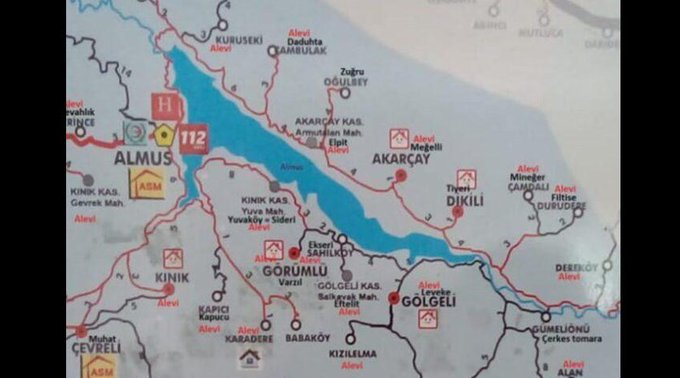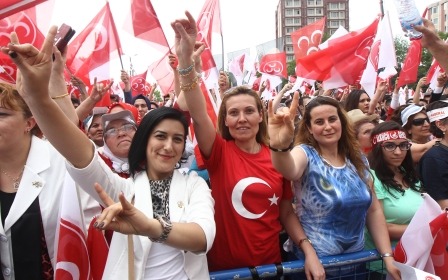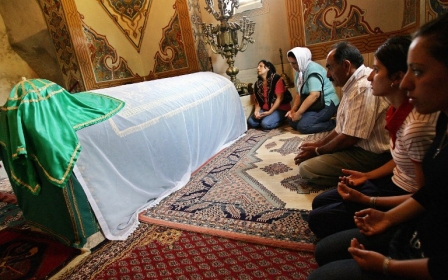Turkey: Doctor's map labelling Alevi villages outrages minority

Members of Turkey's Alevi religious minority have spoken out against sectarianism in the country, after reports emerged that a doctor had issued a map that singled out the location of Alevi-majority villages in the province of Tokat.
According to local media reports, a woman from a village in the Almus district of Tokat took ill and was taken to hospital. Her son, who lived in Istanbul, contacted the hospital to find out about his mother's condition and was sent the map and asked to identify the location of her village.
The map, which bore the logo of the Turkish Ministry of Health, noted a number of towns in red ink with the word "Alevi."
The report led to an outcry, with Alevis on social media accusing the doctor of engaging in sectarianism.
Stay informed with MEE's newsletters
Sign up to get the latest alerts, insights and analysis, starting with Turkey Unpacked
An investigation into the doctor was launched by the Tokat health directorate on Friday, while Turkish health minister Fahrettin Koca commented that "doctors have no right to question a patient's faith or origin".
The health directorate denied that the map had been officially sanctioned.
In an interview with Pir news agency, which focuses on Alevi issues, the unnamed doctor - who said he was also from the Almus region - claimed the furore was a "misunderstanding", and that he had no sectarian intentions.
"I saw a map in the community health centre. I took a picture of the map with my phone and over time I played with it in good faith to get to know the villages better," he told the agency.
"Then I saw the news. I am very sad. I didn't think it would get to this point. I apologise for the misunderstanding."
'Alevism is an honour'
Alevis adhere to a heterodox variant of Shia Islam that venerates Ali, the son-in-law of Prophet Muhammad, and his son Hussain (the Prophet's grandson), who is regarded as a martyr after his death at the Battle of Karbala in 680.
Though no official statistics exist, they are thought to constitute up to a fifth of Turkey's population of 84 million.
Alevis were historically persecuted in both the Ottoman Empire and the Republic of Turkey, with their houses of worship (cemevis) and religious and cultural traditions marginalised. Massacres in the 20th century, largely driven by sectarianism, saw thousands of Alevis killed.
On Friday, the hashtag "Alevism is an honour" was trending on Twitter in Turkey, with many users calling out both the map and anti-Alevi sectarianism:
Translation: Are we surprised? Of course not! Alevi villages of Almus district are marked by writing "Alevi" in red letters on the map of Tokat Provincial Health Directorate. Instead of apologising, the Ministry of Health is investigating the doctor who deciphered this discrimination!
Translation: Now, I don't know how logical it is to mark Alevi villages, neighbourhoods or anything related to Alevism in this way, although we had to stop looking for logic in this country a long time ago.
Translation: You do not need to mark us, we already do not hide that we are Alevis.
Others took the opportunity to point out the discrimination and repression Alevis still face in Turkey, such as the highly controversial Sunni Islamic lessons in schools, which Alevi families have seen as an attempt to erase their cultural and religious identities.
Translation: As a requirement of laicite (secularism), all obstacles to belief groups' self-expression and worship should be removed; assimilation and elimination attempts on this issue should be abandoned.
A number of users shared an image dating from November 2019 of a house in Izmir daubed with a red cross and the words "Alevi, get out", as an example of sectarianism in the country.
Translation: You will mark our houses, we will turn those signs into roses and flowers... Our Kaaba is humanity.
Another longstanding issue for Alevis in Turkey has been calls for the official recognition of Alevism as a religious movement and state support for their cemevi centres.
Since the founding of the republic by Mustafa Kemal Ataturk in 1923, the state has controlled and funded mosques across the country through the Directorate of Religious Affairs, or Diyanet.
There has never been any state funding or recognition for cemevis, though. This, in spite of the fact that Alevis were strongly supportive of Ataturk's secularising policies, which were seen as stripping Sunni religious authorities - who were often staunchly anti-Alevi - of their power.
The coming to power of the Islamist-rooted Justice and Development Party (AKP) in 2002 raised fears among many Alevis that they would face marginalisation by Sunni chauvinism.
In December, there was an outcry after the head of the British Alevi Federation was detained while flying to Istanbul to attend a commemoration of the 1978 Maras massacre.
The massacre, which took place in the southern city of Kahramanmaras, saw almost 200 Alevis killed by members of the far-right Grey Wolves. The Grey Wolves, officially known as Ulku Ocaklari, are linked to the Nationalist Movement Party (MHP), currently political allies of the ruling AKP.
Middle East Eye delivers independent and unrivalled coverage and analysis of the Middle East, North Africa and beyond. To learn more about republishing this content and the associated fees, please fill out this form. More about MEE can be found here.





